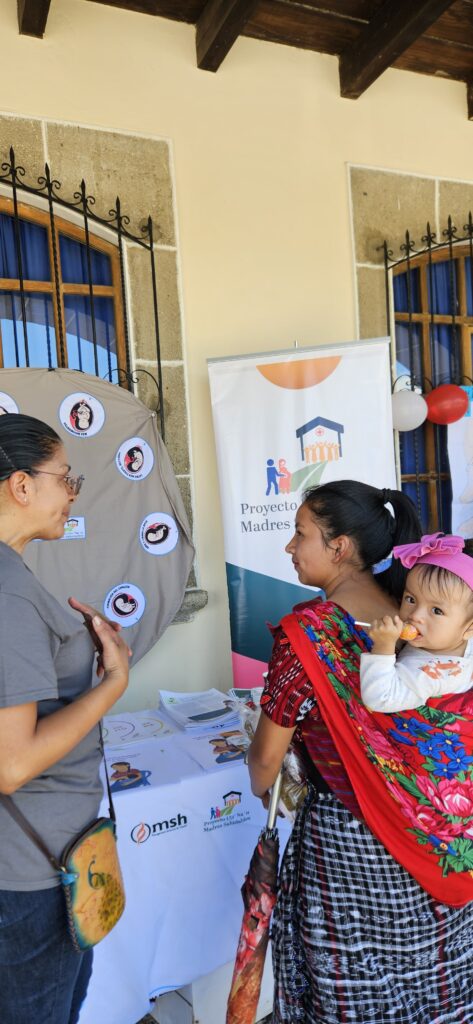MSH’s Group Antenatal Care Model Integrated into Guatemalan Health Care Norms
MSH’s Group Antenatal Care Model Integrated into Guatemalan Health Care Norms

Management Sciences for Health (MSH) applauds Guatemala’s Ministry of Public Health and Social Assistance (MSPAS) for its recent inclusion of an innovative group model of antenatal care (ANC) into the country’s revised national health care norms. The move to include the model—implemented by the MSPAS, with support from MSH and local partners, in the country’s Western Highlands to increase indigenous women’s early access and adherence to ANC services—demonstrates Guatemala’s commitment to scale up and expand this initiative nationwide, marking a significant step in increasing all women’s access to quality, culturally relevant care.
Building on more than 25 years of partnership in Guatemala, MSH has been implementing the Healthy Mothers and Babies project in collaboration with MSPAS and departmental health authorities, local partners, and traditional associations of comadronas, or traditional birth attendants, since 2021. The project, known locally as Utz’ Na’n, aims to increase access to quality and culturally relevant care for indigenous women and adolescents in rural and indigenous regions of San Marcos and Quetzaltenango departments, and—since 2024—has expanded its reach to two additional departments (Totonicapán and Sololá) while broadening its focus to include nutrition during the crucial 1,000 days between a woman’s pregnancy and her child’s second birthday.
Central to the project’s initiative is the introduction of an innovative model of group ANC (GANC), first piloted by MSH in Uganda in 2016. Building on previous successes seen in east Africa, MSH used a human-centered design process to adapt the model to Guatemala’s Western Highlands, where Indigenous women, half of whom deliver at home, face a 30 percent higher risk of maternal mortality with 139 deaths per 100,000 live births. The model facilitates the creation of safe spaces for dialogue among pregnant women, comadronas, and MSPAS health personnel to help pregnant women identify warning signs during pregnancy, seek facility-based care as needed, and promote self-care. At the request of MSPAS, Utz’ Na’n is implementing the GANC model across more than 400 health facilities throughout 81 rural municipalities across the four departments, supporting nearly 32,000 group and individual ANC contacts since May 2020.
MSH is committed to supporting MSPAS in scaling up this lifesaving group model of care, which will ultimately result in better access to ANC services for women throughout the country and support the Ministry’s continued progress in reducing maternal mortality in Guatemala.
Dr. Gustavo Barrios, Utz’ Na’n Project Director
In recognition of this achievement and driven by the enthusiastic response of departmental health teams, MSPAS has opted to incorporate the GANC model into its revised national health care norms, signifying major progress towards improved access to ANC services for all women.
In late July 2025, MSPAS formally presented the revised norms—the first update in more than seven years—which now include the GANC methodology. The group model bridges women’s lived experiences and health providers’ expertise, blending opportunities for connection and peer support with structured education sessions on critical topics such as pregnancy complications, nutrition, childbirth, and postpartum care. Each session is timed to the stage of pregnancy or early motherhood, making the guidance practical and actionable. This dual focus on knowledge and community support builds women’s confidence and preparedness, helps reduce delays in care, and contributes directly to healthier outcomes for families.
“The integration of this model into the national norms is an important step by the MSPAS, and a lasting testament to the decades-long partnership between MSH and the Ministry,” says Dr. Gustavo Barrios, Utz’ Na’n Project Director. “MSH is committed to supporting MSPAS in scaling up this lifesaving group model of care, which will ultimately result in better access to ANC services for women throughout the country and support the Ministry’s continued progress in reducing maternal mortality in Guatemala.” With the incorporation of the GANC model into national norms, MSPAS aims to replicate and extend the reach of this transformative approach beyond the project’s implementation areas, ensuring that women throughout Guatemala have equitable access to high-quality maternal care for years to come.